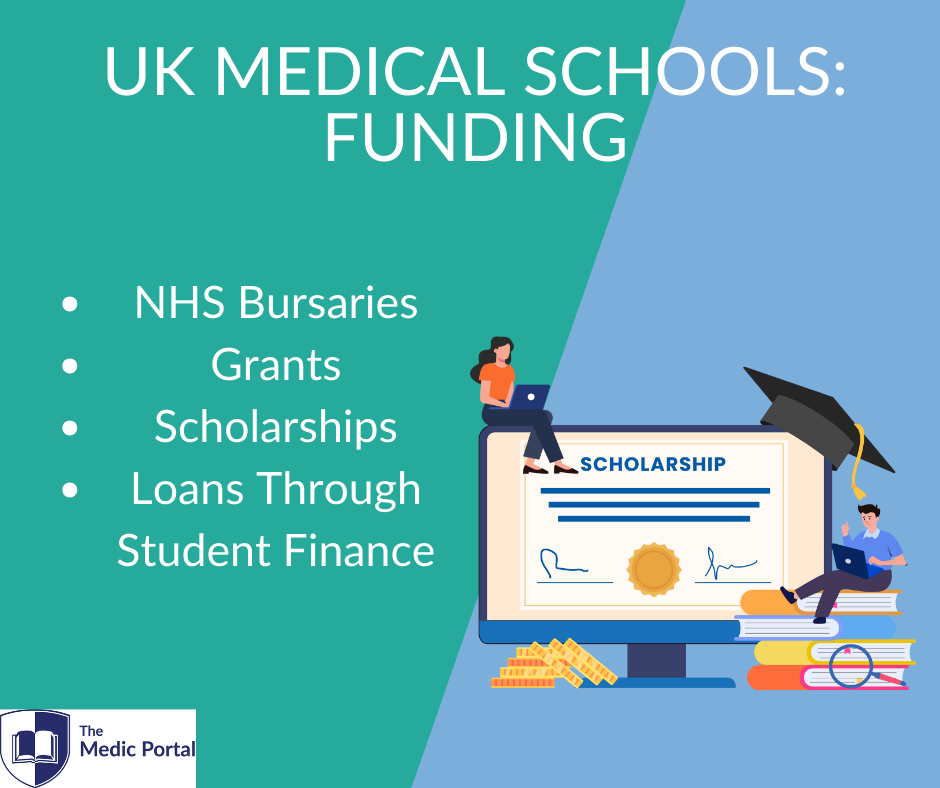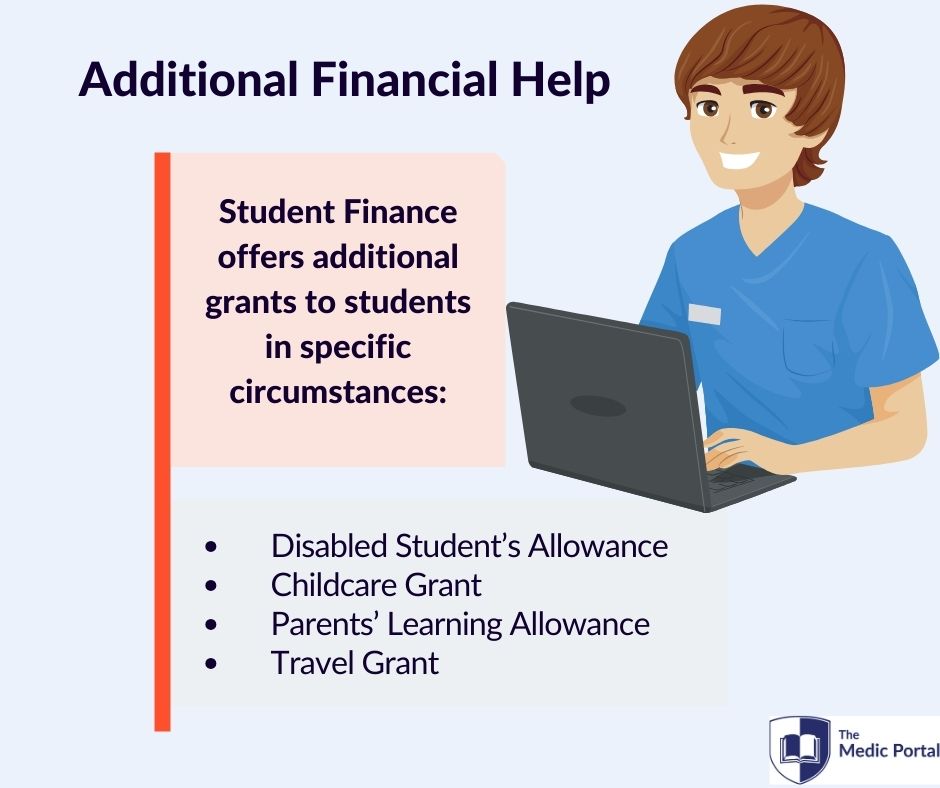How Much Does UK Medical School Cost?
As a medical student, you will have two main costs to meet: tuition fees and living expenses. There may also be extra course costs, for example if you chose to take elective courses. But for now let’s focus on the basics.
Most medical schools in England and Wales charge home students a fixed tuition rate of £9,250 per year. Some schools in Northern Ireland and Scotland differ, depending on where you are from. Additionally, private universities may charge a higher rate.
Fees for international students vary widely and are outlined in the table below. Please note that some Medical Schools are not currently accepting international students.
| University | Costs for UK students (Annual) | Costs for International Students (Annual) |
|---|---|---|
| University of Aberdeen | £9,250 | £50,100 |
| Anglia Ruskin University | £9,250 | From £15,900 |
| Queen Mary University of London | £9,250 | £48,700 |
| University of Birmingham | £9,250 | £30,330 (years 1 & 2), £48,660 (years 3, 4 & 5) |
| Brighton and Sussex Medical School | £9,250 | £42,000 |
| University of Bristol | £9,250 | £42,800 |
| University of Buckingham | £40,000 | £45,000 |
| University of Cambridge | £9,250 | £67,194 |
| Cardiff University | £9,000 | £43,700 |
| University of Dundee | £9,250 | £52,105 |
| Edge Hill University | £9,250 | £16,500 |
| University of Edinburgh | £9,250 | £32,100 (years 1-3), £49,900 (years 4-6) |
| University of Exeter | £9,250 | £45,700 |
| University of Glasgow | £9,250 | £56,520 |
| Hull York Medical School | £9,250 | £43,950 |
| Imperial College London | £9,250 | £45,300 |
| Keele University | £9,250 | £41,000 |
| Kent and Medway Medical School | £9,250 | £46,400 |
| King’s College London | £9,250 | £48,600 |
| Lancaster University | £9,250 | £45,315 |
| University of Leeds | £9,250 | £44,000 |
| University of Leicester | £9,250 | £29,000 |
| University of Liverpool | £9,250 | £42,700 |
| University of Manchester | £9,250 | £38,000 (years 1 & 2), £58,000 (from year 3) |
| Newcastle University | £9,250 | £42,200 |
| University of East Anglia | £9,250 | £42,300 |
| University of Nottingham | £9,250 | £28,700 |
| University of Oxford | £9,250 | £43,670 |
| Plymouth University Peninsula | £9,250 | £22,000 (year 1), £25,500 (year 2), £41,100 (subsequent years) |
| Queens University Belfast | £9,250 | £36,900 |
| University of Sheffield | £9,250 | £43,150 |
| University of Southampton | £9,250 | £28,900 |
| University of St Andrews | £9,250 | £36,990 |
| St George’s University of London | £9,250 | $42,550 |
| University of Sunderland | £9,250 | The course is not open to international students |
| Swansea University | £9,000 | £43,850 |
| University of Central Lancashire | £9,250 | £50,000 |
| University College London | £9,250 | £50,300 |
| University of Warwick | £9,250 | £27,290 (year 1), £47,580 (subsequent years) |
| Brunel University London | £9,250 | £49,395 |
| Ulster University | £9,250 | £37,000 |
| University of Chester | £9,250 | £42,500 |
| University of Worcester | £9,250 | £46,500 |
Can I Get a Loan to Study Medicine in the UK?
For UK students, government loans are available through Student Finance.
UK Undergraduates
Most Medicine degrees are 5-6 years long. Student Finance will fully cover your tuition fees for the first four years. For the final 1 or 2 years, Student Finance will not cover your tuition fees.
You can apply for a loan even if you haven’t received an offer yet. The process is quite simple:
- Start by setting up a Student Finance online account
- You may need to provide evidence of your household income and some other supporting information from your parent or guardian.
- You may need to send in proof of identity.
UK Graduates
Graduate students can either enter an undergraduate course or enter an accelerated Graduate Entry Medicine program. If you choose an undergraduate program, unfortunately, you will be ineligible to have any of your tuition fees covered by Student Finance and so must cover them yourself.
However, if you enrol in an accelerated, graduate-entry course, you are able to receive partial tuition fee cover by Student Finance, typically 2/3rds.
International Students
International students are ineligible to receive a tuition loan from Student Finance, however, there are many private companies you can get a loan from instead.
What Funding is Available?

As outlined above, Student Finance typically does not cover all the costs associated with the course. However, the NHS also provides some funding to students in the form of NHS Bursaries. These are different for graduates vs. undergraduates and can get a little complicated so let’s break it down again!
UK Undergraduates
NHS Bursaries will come into effect in your 5th (and 6th) year, as Student Finance does not cover tuition fees, the NHS will pay for it. Additionally, students will receive a means-tested bursary to help with living costs, with a minimum grant of £1000.
UK Graduates
If you are a Graduate in an Undergraduate program, you will similarly only receive NHS benefits from your 5th year. However, if you are on an accelerated, four-year course, you will receive the NHS Bursary and partial Tuition cover from your 2nd year.
International Students
International Students are not eligible for the NHS Bursary. However, universities often offer additional scholarships to foreign students to compensate for that.
As these are bursaries, you do not need to repay them. Additionally, most universities have their own funding available to help their students. This can come in the form of scholarships, bursaries, grants or funds and are typically awarded for academic/sporting achievements, low household income or to those with disadvantaged backgrounds.
The table below outlines the university-specific funding available to medical students.
| University | Available Funding |
|---|---|
| University of Aberdeen | Two Gateway 2 Medicine scholarships |
| Anglia Ruskin University | Range of ARU scholarships and bursaries |
| Queen Mary University of London | Two means tested scholarships in addition to a range of other QMUL bursaries and scholarships |
| University of Birmingham | No specific medicine funding but other QMUL funding available |
| Brighton and Sussex Medical School | Means tested Brighton Bursary |
| University of Bristol | Two scholarships available in addition to a hardship fund |
| University of Buckingham | Buckingham offers a variety of scholarships in addition to automatic scholarships for high achievers |
| University of Cambridge | Cambridge offers a Medicine Bursary for each year in addition to scholarships |
| Cardiff University | Cardiff University offers various financial support for their students including Grants, Bursaries and scholarships |
| University of Dundee | Dundee offers scholarships for Medicine depending on academic achievement and household income. These scholarships vary depending on your nationality |
| Edge Hill University | Edge Hill offers sports scholarships in addition to a Student Support Fund |
| University of Edinburgh | Edinburgh offers a range of financial support including scholarships depending on your nationality |
| University of Exeter | Exeter has many different scholarships available for academic excellence in addition to disadvantaged students |
| University of Glasgow | Glasgow offers nine different different scholarships for their Medical Students |
| Hull York Medical School | Hull York offers UK students a Medical School Bursary |
| Imperial College London | UK Medical students are eligible for their Imperial Bursary Scheme |
| Keele University | Keele offers their UK and international Medical Students bursaries and scholarships |
| Kent and Medway Medical School | KMMS offers a financial support package to eligible Medical Students |
| King’s College London | King’s offers a range of financial support including grants, scholarships, bursaries and hardship funds |
| Lancaster University | Lancaster automatically considers their medical students for a range of scholarships and bursaries |
| University of Leeds | Leeds offers their Medical Students in addition to other financial support scholarships |
| University of Leicester | Leicester offers Medical Students a range of scholarships including Sport and Sanctuary |
| University of Liverpool | Liverpool has scholarships and bursaries available |
| University of Manchester | No specific funding for medicine but plenty of financial support available through the University |
| Newcastle University | Four Medicine-specific bursaries and scholarships in addition to wider financial support |
| University of East Anglia | A range of scholarships available |
| University of Nottingham | Nottingham Potential Bursary in addition to Medicine scholarships |
| University of Oxford | Bursary packages available to UK students as well as a range of scholarships and bursariesof scholarships and bursaries |
| Plymouth University Peninsula | Scholarships and other financial aid available through the wider University |
| Queens University Belfast | A range of scholarships available |
| University of Sheffield | Bursaries and scholarships available to home and international students |
| University of Southampton | Means-tested Southampton Bursary in addition to other funding support |
| University of St Andrews | Bursaries and scholarships available |
| St George’s University of London | St George’s Opportunity Fund Grant for students with lower income backgrounds in addition to other grants and bursaries |
| University of Sunderland | University of Sunderland Medicine bursaries available |
| Swansea University | A range of scholarships available |
| University of Central Lancashire | Medicine scholarship in addition to other financial support |
| University College London | UCL has a number of scholarships, bursaries and hardship funds for Medical Students |
| University of Warwick | Means-tested Warwick Bursary for the first year of medicine in addition to a other financial support |
| Brunel University London | Three Medical scholarships available to international students |
| Ulster University | Medical Education scholarships available |
| University of Chester | Scholarships including an international scholarship available |
| University of Worcester | Scholarship and hardship fund available |
Can I Get Help with Living Expenses?
For UK Students, Student Finance provides maintenance loans in addition to tuition loans. Maintenance loans are means-tested, meaning the amount you get will depend on your household income and other situational circumstances. Maintenance loans of up to £13,022 are available to help students with their living expenses.
UK Undergraduates
For the first four years, you will receive the same maintenance loan you would in any other degree. However, from your fifth year, your maintenance loan is at a reduced rate but this is when your NHS Bursary comes into effect.
UK Graduates
Although graduate students on an undergraduate course are unable to access tuition loans through Student Finance, they are able to apply for a maintenance loan, yet this may be at a reduced rate. Similarly, graduates in a graduate-entry program also have access to the maintenance loan, again at a reduced rate.
International Students
International Students are unable to receive a maintenance loan from the government, however, they may be able to receive a loan privately.
Is Extra Financial Help Available?

NHS Bursaries also help with additional costs associated with studying medicine for example travel expenses and placement accommodation.
Furthermore, there is the opportunity for cadetship within the Army, Navy or Royal Air Force in which student bursaries can be worth up to £75,000 depending on the sector. The cadetship requires some training during your degree and a minimum of four years of service after, this varies depending on the sector.
There is also the opportunity to ‘win’ financial help by entering Medicine Essay competitions or other such awards. These, however, will only be available to enter once you have been enrolled in your course.
